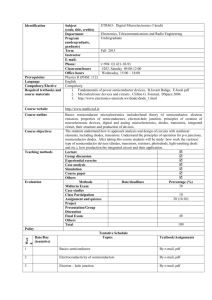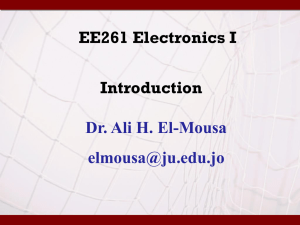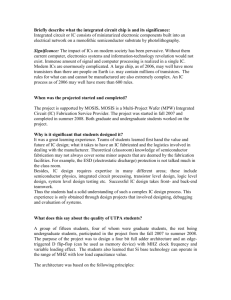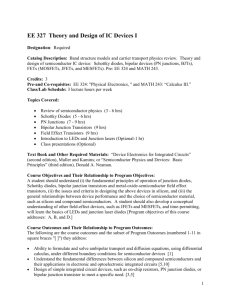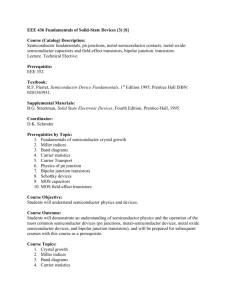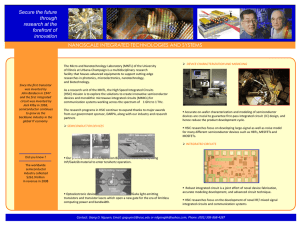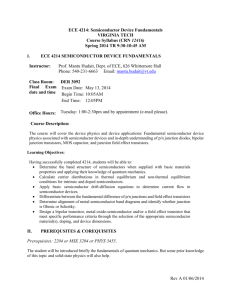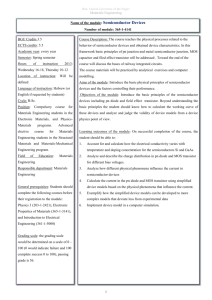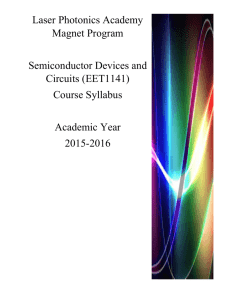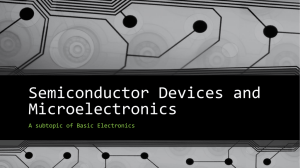Identification - Khazar University
advertisement
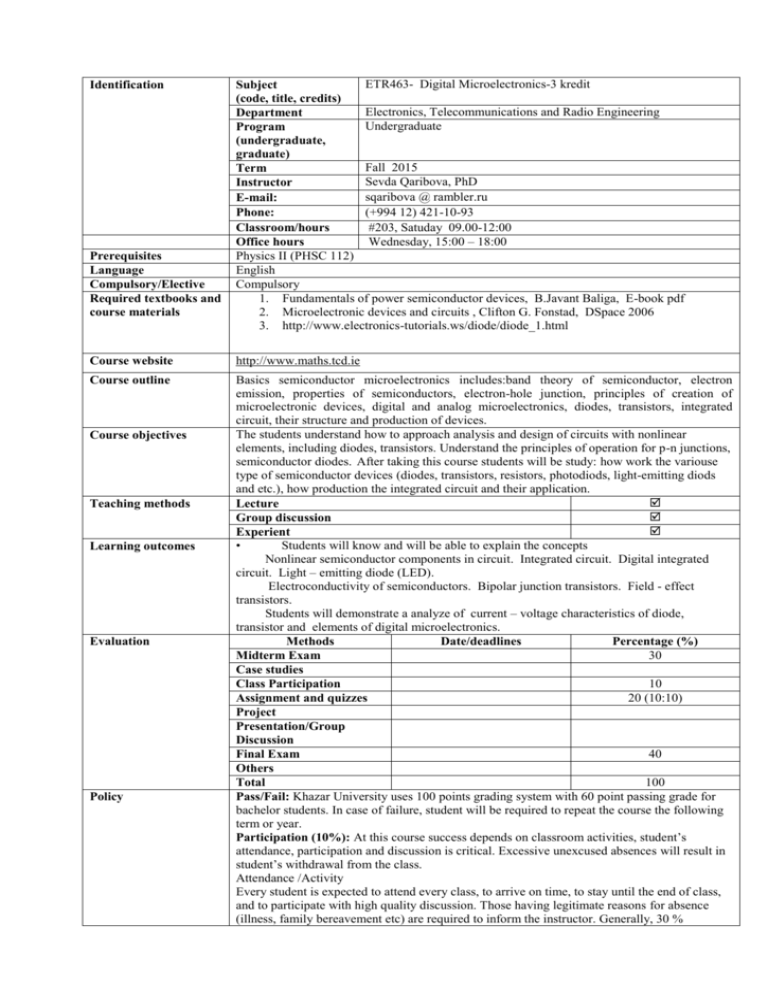
Identification Prerequisites Language Compulsory/Elective Required textbooks and course materials ETR463- Digital Microelectronics-3 kredit Subject (code, title, credits) Electronics, Telecommunications and Radio Engineering Department Undergraduate Program (undergraduate, graduate) Fall 2015 Term Sevda Qaribova, PhD Instructor sqaribova @ rambler.ru E-mail: (+994 12) 421-10-93 Phone: #203, Satuday 09.00-12:00 Classroom/hours Wednesday, 15:00 – 18:00 Office hours Physics II (PHSC 112) English Compulsory 1. Fundamentals of power semiconductor devices, B.Javant Baliga, E-book pdf 2. Microelectronic devices and circuits , Clifton G. Fonstad, DSpace 2006 3. http://www.electronics-tutorials.ws/diode/diode_1.html Course website http://www.maths.tcd.ie Course outline Basics semiconductor microelectronics includes:band theory of semiconductor, electron emission, properties of semiconductors, electron-hole junction, principles of creation of microelectronic devices, digital and analog microelectronics, diodes, transistors, integrated circuit, their structure and production of devices. The students understand how to approach analysis and design of circuits with nonlinear elements, including diodes, transistors. Understand the principles of operation for p-n junctions, semiconductor diodes. After taking this course students will be study: how work the variouse type of semiconductor devices (diodes, transistors, resistors, photodiods, light-emitting diods and etc.), how production the integrated circuit and their application. Lecture Group discussion Experient • Students will know and will be able to explain the concepts Nonlinear semiconductor components in circuit. Integrated circuit. Digital integrated circuit. Light – emitting diode (LED). Electroconductivity of semiconductors. Bipolar junction transistors. Field - effect transistors. Students will demonstrate a analyze of current – voltage characteristics of diode, transistor and elements of digital microelectronics. Methods Date/deadlines Percentage (%) 30 Midterm Exam Case studies 10 Class Participation 20 (10:10) Assignment and quizzes Project Presentation/Group Discussion 40 Final Exam Others 100 Total Pass/Fail: Khazar University uses 100 points grading system with 60 point passing grade for bachelor students. In case of failure, student will be required to repeat the course the following term or year. Participation (10%): At this course success depends on classroom activities, student’s attendance, participation and discussion is critical. Excessive unexcused absences will result in student’s withdrawal from the class. Attendance /Activity Every student is expected to attend every class, to arrive on time, to stay until the end of class, and to participate with high quality discussion. Those having legitimate reasons for absence (illness, family bereavement etc) are required to inform the instructor. Generally, 30 % Course objectives Teaching methods Learning outcomes Evaluation Policy Wee k unauthorized absence marks will lead to the student’s expulsion from the Course. If student is late to the class for more than five (5) minutes, then he/she may not be allowed to enter and disturb the class. For successful completion of the course, the students shall take an active part during classes, raising questions and participating in-group discussions. Professional Behavior Guidelines: The student shall behave in the way to create favorable academic and professional environment during the class hours. Unauthorized discussions and unethical behavior are strictly prohibited. Honesty Issues: All Khazar University students are bound by honor to maintain the highest level of academic integrity. By virtue of membership in the Khazar University community, every student accepts the responsibility to know the rules of academic honesty, to abide by them at all times, and to encourage all others to do the same. Cheating or other plagiarism during the mid-term and final examinations will lead to paper cancellation. In this case, the student will automatically get zero (0), without any considerations. Students are supposed to read about the topics before they are discussed in lectures. It is not necessary that students study them carefully, but at least they should get the "smell of it". This should make it much easier for students to follow the lectures and find them more interesting. Tentative Schedule Topics Textbook/Assignments Date/Day (tentative) 1 16.09 Basics semiconductor By e-mail, pdf 2 23.09 Electroconductivity of semiconductors By e-mail, pdf 3 30.09 Electron – hole junction By e-mail, pdf 4 07.10 The p – n junction diode B.Javant Baliga , Fundamentals of power semiconductor devices, E-book, pdf 5 14.10 Transistors By e-mail, pdf 6 21.10 Bipolar junction transistors By e-mail, pdf 7 28.10 Analyze of current – voltage characteristics of diode and transistor By e-mail, pdf 8 04.11 Midterm Exam 9 11.11 Field - effect transistors Microelectronic devices and circuits , Clifton G. Fonstad, DSpace 2006 E-book, pdf 10 18.11 Nonlinear semiconductor components in circuit By e-mail, pdf 11 25.11 Light – emitting diode (LED) By e-mail, pdf 12 02.12 Photodiode By e-mail, pdf 13 09.12 Zener diode By e-mail, pdf 14 16.12 Integrated circuit By e-mail, pdf 15 23.12 Digital integrated circuit Final Exam By e-mail, pdf
